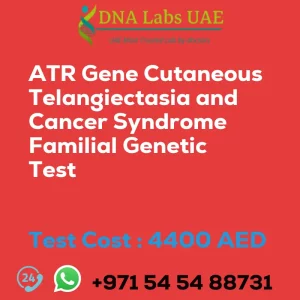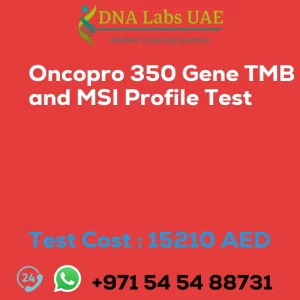H19 Gene Beckwith-Wiedemann syndrome Genetic Test
At DNA Labs UAE, we offer the H19 Gene Beckwith-Wiedemann syndrome Genetic Test for individuals suspected of having Beckwith-Wiedemann syndrome (BWS), a rare genetic disorder characterized by overgrowth, abdominal wall defects, an increased risk of childhood cancer, and other physical abnormalities.
Test Details
The H19 gene is associated with BWS. Our Next-generation sequencing (NGS) technology allows for the rapid and simultaneous sequencing of multiple genes or even the entire genome. In the context of BWS, NGS genetic testing refers to the analysis of the H19 gene using this advanced sequencing technology.
Test Components and Price
Test Name: H19 Gene Beckwith-Wiedemann syndrome Genetic Test
Components: NGS Technology
Price: 4400.0 AED
Sample Condition
Blood or Extracted DNA or One drop Blood on FTA Card
Report Delivery
3 to 4 Weeks
Test Type
Cancer
Doctor
Oncologist
Test Department
Genetics
Pre Test Information
Clinical History of Patient who is going for H19 Gene Beckwith-Wiedemann syndrome NGS Genetic DNA Test. A Genetic Counselling session to draw a pedigree chart of family members affected with H19 Gene Beckwith-Wiedemann syndrome NGS Genetic DNA Test gene H19.
Method
NGS Technology
Test Details
The H19 gene is associated with Beckwith-Wiedemann syndrome (BWS), a rare genetic disorder characterized by overgrowth, abdominal wall defects, an increased risk of childhood cancer, and other physical abnormalities. Next-generation sequencing (NGS) is a technology used for genetic testing that allows for the rapid and simultaneous sequencing of multiple genes or even the entire genome. In the context of BWS, NGS genetic testing refers to the analysis of the H19 gene using this advanced sequencing technology.
NGS genetic testing for BWS involves obtaining a DNA sample, typically through a blood or saliva sample, from the individual suspected of having the disorder. The DNA is then sequenced using NGS technology to identify any mutations or abnormalities in the H19 gene. These mutations can help confirm a diagnosis of BWS and provide important information about the specific genetic cause of the disorder.
The results of the NGS genetic test for BWS can help guide medical management and provide information about the risk of developing certain complications associated with the disorder. Additionally, genetic testing can be useful for identifying family members who may also be at risk of having BWS or carrying the genetic mutation.
It is important to note that genetic testing for BWS, including NGS testing of the H19 gene, should be conducted and interpreted by a qualified geneticist or genetic counselor who specializes in the diagnosis and management of genetic disorders. They can provide guidance on the appropriate testing options, explain the implications of the results, and offer support and counseling for individuals and families affected by BWS.
| Test Name | H19 Gene Beckwith-Wiedemann syndrome Genetic Test |
|---|---|
| Components | |
| Price | 4400.0 AED |
| Sample Condition | Blood or Extracted DNA or One drop Blood on FTA Card |
| Report Delivery | 3 to 4 Weeks |
| Method | NGS Technology |
| Test type | Cancer |
| Doctor | Oncologist |
| Test Department: | Genetics |
| Pre Test Information | Clinical History of Patient who is going for H19 Gene Beckwith-Wiedemann syndrome NGS Genetic DNA Test. A Genetic Counselling session to draw a pedigree chart of family members affected with H19 Gene Beckwith-Wiedemann syndrome NGS Genetic DNA Test gene H19 |
| Test Details |
The H19 gene is associated with Beckwith-Wiedemann syndrome (BWS), a rare genetic disorder characterized by overgrowth, abdominal wall defects, an increased risk of childhood cancer, and other physical abnormalities. Next-generation sequencing (NGS) is a technology used for genetic testing that allows for the rapid and simultaneous sequencing of multiple genes or even the entire genome. In the context of BWS, NGS genetic testing refers to the analysis of the H19 gene using this advanced sequencing technology. NGS genetic testing for BWS involves obtaining a DNA sample, typically through a blood or saliva sample, from the individual suspected of having the disorder. The DNA is then sequenced using NGS technology to identify any mutations or abnormalities in the H19 gene. These mutations can help confirm a diagnosis of BWS and provide important information about the specific genetic cause of the disorder. The results of the NGS genetic test for BWS can help guide medical management and provide information about the risk of developing certain complications associated with the disorder. Additionally, genetic testing can be useful for identifying family members who may also be at risk of having BWS or carrying the genetic mutation. It is important to note that genetic testing for BWS, including NGS testing of the H19 gene, should be conducted and interpreted by a qualified geneticist or genetic counselor who specializes in the diagnosis and management of genetic disorders. They can provide guidance on the appropriate testing options, explain the implications of the results, and offer support and counseling for individuals and families affected by BWS. |








